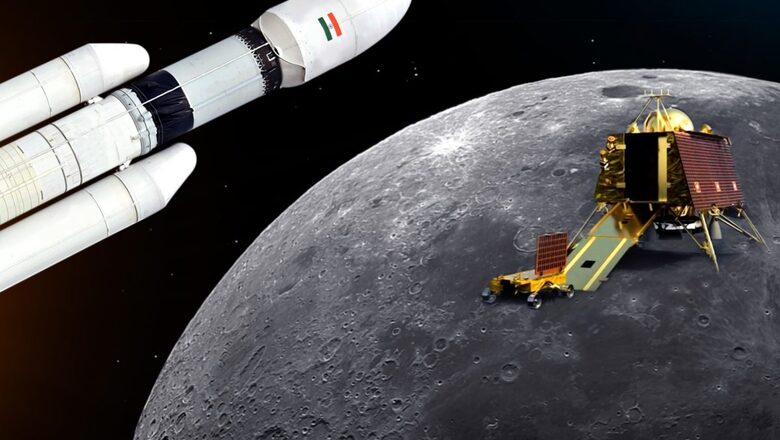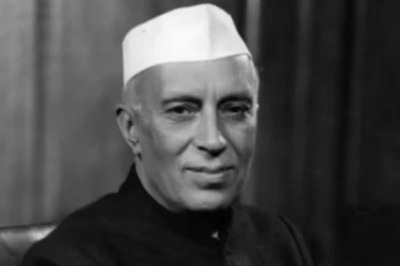
views
When The New York Times scoffed at India a few years back to even try and send a lander with a rover to the Moon or attempt a Mars Mission, the publication may not have imagined that it would be real in a very short span. An offending cartoon of 2014 in NYT summed up the editorial board’s humiliation of India’s gumption to get into the ‘elitist space club’ to explore Mars and Moon. But then, the same cartoon made its way to social media networks on Wednesday with suggestions that The New York Times make amends after India’s Chandraayan-3 led to textbook precision touch down of lander ‘Vikram’ and the rover ‘Pragyan’, getting out to explore the Moon’s south pole.
There were foreign media house handles that did hail India’s feat. Some did so grudgingly while a few did with disbelief. However, newspaper establishments or TV channels from Europe, the US and the UK, in particular, were not remorseful about their stance vis-à-vis a purely scientific mission undertaken by a developing country like India with gusto.
Some netizens pointed out that the cartoon drawn by Singapore-based Heng Kim Song in NYT may have been ‘racist’ and ‘offensive’ in tone. On the other hand, The Economist may not have been very happy with Prime Minister Modi for describing the feat as the ‘victory of a new India’. What’s wrong with the head of the nation sporting his country’s flag? India being victorious is not a crime. Its write-up of August 23, 2023, on India’s Moon mission was peppered with an acerbic claim that its rover was not as good as the one planned by America or the one owned by China. Even gleeful ‘emojis’ and ‘jai hind’ (long live India) slogans that flooded the internet after India’s Moon feat seemed inconvenient for The Economist who could not fully appreciate the aspirational and assertive India’s mindset.
Bloomberg’s Andy Mukherjee gave a political twist to India’s Chandrayaan-3 mission by buying into the Congress charge that the engineers who built the Chandrayaan-3 launchpad were not paid their salaries for 17 months. Mukherjee seems to have waded big into Indian political waters.
Well, this jingo apart, India’s ‘historic moment’ after the moon landing opens a clutch of opportunities for humanity and a major chunk of the world’s population, as pointed out by Prime Minister Narendra Modi from Johannesburg in South Africa where he’s huddled with BRICS leaders.
What’s very significant about the Moon landing by Indian craft is that it opens the space sector, estimated at $546 billion, for home-grown startups, and small, medium, and micro enterprises apart from the big boys.
A big spurt of over 15 per cent at Rs 13,000 crore in market capitalization of companies that contribute to the space sector in one trading session on bourses manifests the potential that the sector holds for business growth and expansion. 16 space technology companies in India that took roots have also got the first and second round of funding from angel investors and established fund houses globally. About 30-odd small ticket funding deals clinched in the last couple of years have only added to excitement after the sector was opened to private and foreign partnerships.
India may very well put its bets on the space economy that is estimated to expand to $100 billion by 2025 and account for nine per cent of the global share from a measly two per cent now. If Prime Minister Modi’s proposal to float a space consortium by BRICS gets adopted, the space economy’s contribution to developing countries’ progress and development will go up multi-fold. This is one level above the BRICS satellite constellation that’s being developed. Collaborative research, skills development, education and related technologies can be jointly harvested to create a common pool.
Evolving Indian counterparts to large companies like SpaceX, Blue Origin, Virgin Galactic and Arianespace is what Bharat can look forward to as the country readies missions to Sun and Venus beginning next month.
Going forward, creating space economy leaders of our own with the vision to realise India’s vast potential in the next 25 years is something we need to work on methodically. Creating separate funding buckets to bankroll technology-intensive space ventures through equity and zero-rate debt is something that India will have to pursue to quickly realise growth and expansion.
Collaboration and finding the right partners for each of the space missions may be the key for every country that’s exploring the universe.
The author is Director and Chief Executive, Centre for Integrated and Holistic Studies, New Delhi based non-partisan think tank. Views expressed in the above piece are personal and solely that of the author. They do not necessarily reflect News18’s views.




















Comments
0 comment